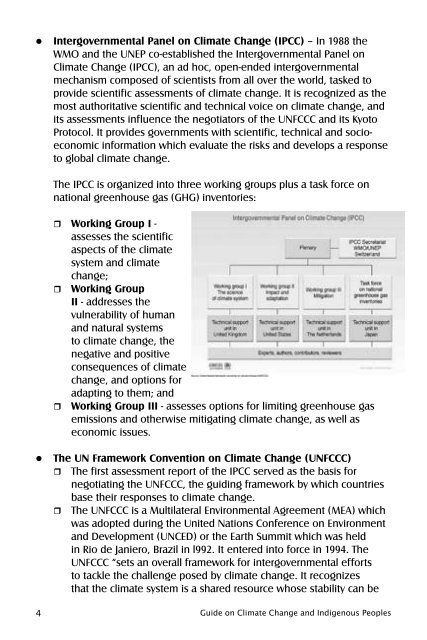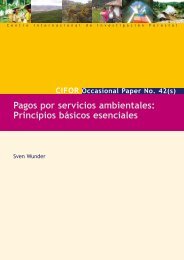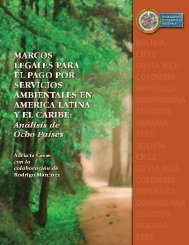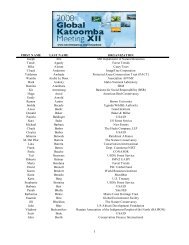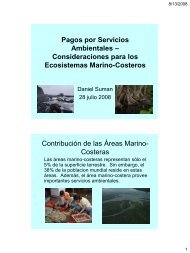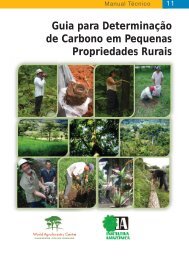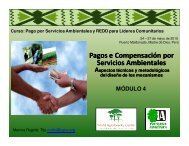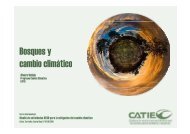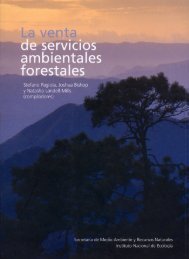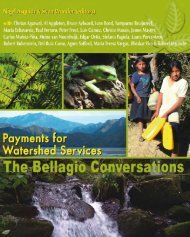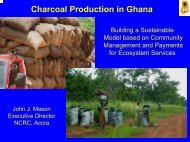Guide on Climate Change and Indigenous Peoples
Guide on Climate Change and Indigenous Peoples
Guide on Climate Change and Indigenous Peoples
- No tags were found...
You also want an ePaper? Increase the reach of your titles
YUMPU automatically turns print PDFs into web optimized ePapers that Google loves.
• Intergovernmental Panel <strong>on</strong> <strong>Climate</strong> <strong>Change</strong> (IPCC) – In 1988 theWMO <strong>and</strong> the UNEP co-established the Intergovernmental Panel <strong>on</strong><strong>Climate</strong> <strong>Change</strong> (IPCC), an ad hoc, open-ended intergovernmentalmechanism composed of scientists from all over the world, tasked toprovide scientific assessments of climate change. It is recognized as themost authoritative scientific <strong>and</strong> technical voice <strong>on</strong> climate change, <strong>and</strong>its assessments influence the negotiators of the UNFCCC <strong>and</strong> its KyotoProtocol. It provides governments with scientific, technical <strong>and</strong> socioec<strong>on</strong>omicinformati<strong>on</strong> which evaluate the risks <strong>and</strong> develops a resp<strong>on</strong>seto global climate change.The IPCC is organized into three working groups plus a task force <strong>on</strong>nati<strong>on</strong>al greenhouse gas (GHG) inventories: Working Group I -assesses the scientificaspects of the climatesystem <strong>and</strong> climatechange; Working GroupII - addresses thevulnerability of human<strong>and</strong> natural systemsto climate change, thenegative <strong>and</strong> positivec<strong>on</strong>sequences of climatechange, <strong>and</strong> opti<strong>on</strong>s foradapting to them; <strong>and</strong> Working Group III - assesses opti<strong>on</strong>s for limiting greenhouse gasemissi<strong>on</strong>s <strong>and</strong> otherwise mitigating climate change, as well asec<strong>on</strong>omic issues.• The UN Framework C<strong>on</strong>venti<strong>on</strong> <strong>on</strong> <strong>Climate</strong> <strong>Change</strong> (UNFCCC) The first assessment report of the IPCC served as the basis fornegotiating the UNFCCC, the guiding framework by which countriesbase their resp<strong>on</strong>ses to climate change. The UNFCCC is a Multilateral Envir<strong>on</strong>mental Agreement (MEA) whichwas adopted during the United Nati<strong>on</strong>s C<strong>on</strong>ference <strong>on</strong> Envir<strong>on</strong>ment<strong>and</strong> Development (UNCED) or the Earth Summit which was heldin Rio de Janiero, Brazil in l992. It entered into force in 1994. TheUNFCCC “sets an overall framework for intergovernmental effortsto tackle the challenge posed by climate change. It recognizesthat the climate system is a shared resource whose stability can be4 <str<strong>on</strong>g>Guide</str<strong>on</strong>g> <strong>on</strong> <strong>Climate</strong> <strong>Change</strong> <strong>and</strong> <strong>Indigenous</strong> <strong>Peoples</strong>


